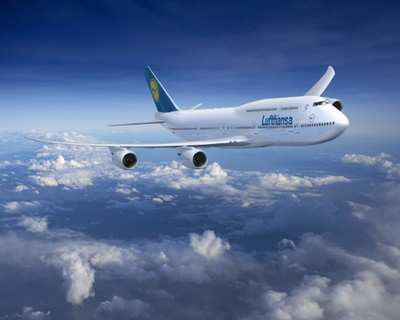Wed, Jan 04, 2012
Airline Says It Will Not Absorb Costs Of EU-ETS, Pax Will
Pay
Lufthansa may be setting the tone for how airlines will handle
the EU's Emissions Trading Scheme (ETS) by telling passengers it
will increase ticket prices to cover the costs of the controversial
plan which went into effect January 1st.

The airline is facing about $169 million in additional operating
overhead to comply with the ETS, according to a report from
Reuters. As the world's second-largest airline, Lufthansa will be
one of the most affected by the new carbon tax.
In a statement posted on its website, Lufthansa said that in
2012, 82 per cent of the necessary certificates will be awarded to
airlines free of charge. Airlines will have to purchase another 15
per cent of the certificates, with 3 per cent being reserved for
new airlines. As these allocations are based on average emissions
for the years 2004 to 2006, the Lufthansa Group will have to buy at
least 35 per cent of the certificates it needs to represent its
growth in recent years. Judging by the average trend in certificate
prices, Lufthansa expects to incur additional expenses of EUR 130m
in 2012. As competition is tough - especially from non-EU
companies, whose operations are only subject to limited emissions
trading rules - Lufthansa will have to pass on the costs via higher
ticket prices, as recommended by the EU. Lufthansa will therefore
include the cost of purchasing the certificates in its existing
fuel surcharge as of the beginning of 2012. However, it has no
immediate plans to increase this surcharge.
“Climate change is a global challenge. This means we also
need a global solution," said Carsten Spohr, Member of the
Executive Board of Deutsche Lufthansa AG, in the statement. "The
incorporation of airlines in the EU Emissions Trading Scheme means
that European operators are now facing additional costs which will
make flying within and via Europe more expensive for passengers. It
will also distort competition and impact on the sustainability of
the aviation industry if it proves impossible to implement with the
competitive neutrality promised by policy makers. However, given
the huge resistance at international level, it is unclear just how
the situation will develop.”
Lufthansa last raised its fuel surcharge for European and
long-haul flights on 15 December 2011 by three to ten euros. In the
future, the surcharge will reflect both the price of oil and the
cost of acquiring emission rights.
The imposition of the carbon tax has caused talks of a looming
trade war between Europe and the U.S., China, Dubai, and
others which do not agree that foreign-flagged carriers should pay
a tax imposed by the European Union.
More News
Aero Linx: International Federation of Airworthiness (IFA) We aim to be the most internationally respected independent authority on the subject of Airworthiness. IFA uniquely combi>[...]
Ultrahigh Frequency (UHF) The frequency band between 300 and 3,000 MHz. The bank of radio frequencies used for military air/ground voice communications. In some instances this may >[...]
A Few Questions AND Answers To Help You Get MORE Out of ANN! 1) I forgot my password. How do I find it? 1) Easy... click here and give us your e-mail address--we'll send it to you >[...]
From 2019 (YouTube Edition): Learning To Paint Without Getting Any On Your Hands PPG's Aerospace Coatings Academy is a tool designed to teach everything one needs to know about all>[...]
Also: Sustainable Aircraft Test Put Aside, More Falcon 9 Ops, Wyoming ANG Rescue, Oreo Cookie Into Orbit Joby Aviation has reason to celebrate, recently completing its first full t>[...]
 ANN's Daily Aero-Linx (05.06.25)
ANN's Daily Aero-Linx (05.06.25) ANN's Daily Aero-Term (05.06.25): Ultrahigh Frequency (UHF)
ANN's Daily Aero-Term (05.06.25): Ultrahigh Frequency (UHF) ANN FAQ: Q&A 101
ANN FAQ: Q&A 101 Classic Aero-TV: Virtual Reality Painting--PPG Leverages Technology for Training
Classic Aero-TV: Virtual Reality Painting--PPG Leverages Technology for Training Airborne 05.02.25: Joby Crewed Milestone, Diamond Club, Canadian Pilot Insurance
Airborne 05.02.25: Joby Crewed Milestone, Diamond Club, Canadian Pilot Insurance



